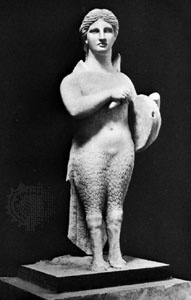Siren
Greek mythology
 in Greek mythology, a creature half bird and half woman who lured sailors to destruction by the sweetness of her song. According to Homer there were two Sirens on an island in the western sea between Aeaea and the rocks of Scylla. Later the number was usually increased to three, and they were located on the west coast of Italy, near Naples. They were variously said to be the daughters of the sea god Phorcys or of the river god Achelous by one of the Muses.
in Greek mythology, a creature half bird and half woman who lured sailors to destruction by the sweetness of her song. According to Homer there were two Sirens on an island in the western sea between Aeaea and the rocks of Scylla. Later the number was usually increased to three, and they were located on the west coast of Italy, near Naples. They were variously said to be the daughters of the sea god Phorcys or of the river god Achelous by one of the Muses.In Homer's Odyssey, Book XII, the Greek hero Odysseus, advised by the sorceress Circe, escaped the danger of their song by stopping the ears of his crew with wax so that they were deaf to the Sirens; yet he was able to hear the music and had himself tied to the mast so that he could not steer the ship out of course. Apollonius of Rhodes, in Argonautica, Book IV, relates that when the Argonauts (Argonaut) sailed that way, Orpheus sang so divinely that none of them listened to the Sirens. Ovid (Metamorphoses, Book V) wrote that the Sirens were human companions of Persephone. After she was carried off by Hades, they sought her everywhere and finally prayed for wings to fly across the sea. The gods granted their prayer. In some versions Demeter turns them into birds to punish them. In Hyginus's Fabulae, No. 141, after one or other of these failures the Sirens committed suicide. In art they appeared first as birds with the heads of women, later as women, sometimes winged, with bird legs.
The Sirens seem to have evolved from a primitive tale of the perils of early exploration combined with an Asian image of a bird-woman. Anthropologists explain the Asian image as a soul-bird—i.e., a winged ghost that stole the living to share its fate. In that respect the Sirens had affinities with the Harpies.
- Edna O'Brien
- Edna Purviance
- Edna St. Vincent Millay
- Edo
- Edoardo Mangiarotti
- Edom
- E. Donnall Thomas
- Edouard Estaunié
- Edouard Séguin
- Edouard van Beneden
- Ed Ruscha
- EDSAC
- Edson, Katherine Philips
- Ed Sullivan
- Eduard Adolf Strasburger
- Eduard Bernstein
- Eduard Buchner
- Eduard, Count von Taaffe
- Eduard Devrient
- Eduard Friedrich Mörike
- Eduard Gans
- Eduard Georgiyevich Bagritsky
- Eduard Hanslick
- Eduard Heinrich David
- Eduard Hermann